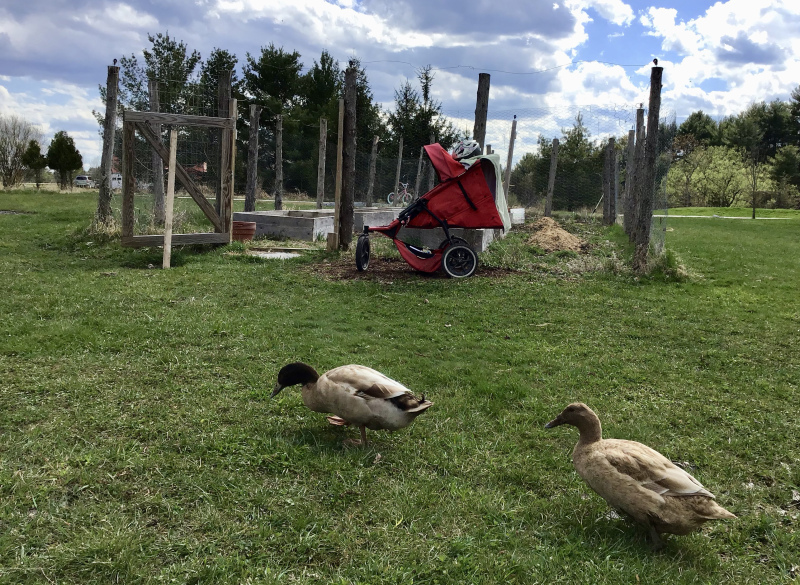

This will likely be a short column, because we are in the midst of putting in our garden.
I have a complex relationship with my garden — as, I suspect, do many. Starting around March, a feeling that has lain dormant throughout the winter begins to stir in me: panic. Suddenly, I feel the urge to start drawing up a planting schedule and ordering seeds. This feeling intensifies as the days lengthen. By the time we start planting, usually in late April, my panic has been replaced with a lingering guilt. I feel guilty if I’m not out working in the garden when the weather is fine. When the forecast calls for rain, I am almost always relieved; nobody would expect me to be out working in my garden in the rain, would they?
Yet I will tell you that I love gardening.
This year, our gardening season has overlapped almost exactly with the COVID-19 quarantine. I hear that more people are planning to put in gardens this year, driven perhaps by the desire to have a food source that doesn’t involve navigating grocery stores, or inspired by more unscheduled time at home. But I wonder how many people shared this thought along with me, as I pulled on my garden gloves and picked up my shovel: Finally! Something I can control!
A global pandemic, a virus that experts still don’t entirely understand, and a quarantine that continues to stretch on; as my husband says, “The only thing we can be certain of right now is uncertainty.”
Putting in the garden this year felt like it just might be something of which I could be certain, my own little kingdom of dirt and seeds.
And, as it does every year, my garden showed me quickly how wrong I was. Planting a garden with the belief that you can control it is about as delusional as having children for the same reason.
There were frustrations from the get-go. Some of my attempts at conception failed: Fully half of the seeds I started indoors refused to germinate for reasons that I still can’t puzzle out.
“What happened to your arms?!?” my daughter gasped at dinner after I’d attempted to weed the raspberry patch. The raspberry bushes had responded to my efforts as gratefully as sulky teenagers denied a request to attend a late-night party.
Then there was the hour I spent hunched over the strawberry plants, which had weeds entwined among their runners. Freeing the patch of weeds without ripping up the strawberries themselves would have required tweezers and surgical precision. It reminded me of those tortuous discipline decisions we make as parents: How do I deal with this behavior without crushing my child’s spirit and destroying what makes them unique?
This is just the start, mind you: There are months ahead in which the weather will surely be either too wet or too dry, in which certain plants will refuse to come up despite my care, and in which I will never be able to stay ahead of the weeds.
In fact, the more I think about it, embarking on gardening — like embarking on parenting — is a guaranteed way to feel completely out of control.
So why do we do it?
A few days ago, our chicks arrived. We are raising just four chicks this year, to replace the hens a hawk picked off over the winter. As with gardening, I hear that more people are considering poultry keeping in this quarantine culture. On the same day that our chicks came, a friend emailed from California to ask my advice about raising chickens. When I re-read my response to her, I was horrified: My list of cons far outweighed the pros.
Among the negatives of chicken keeping: Buying supplies and food, daily chores, waste disposal, and — in our experience, at least — birds that are not the cuddly pets promised by their chick days. My positives? Eggs, of course. Teaching children responsibility and the care of living things — assuming that they do the poultry chores, which, in our family, is extremely sporadic and seasonal. My final positive was that chicken keeping teaches children about death, which, on further consideration, may not belong in the “positive” category.
Were I to make a list of reasons to garden, or to have children, I suspect that it would be similarly unbalanced.
Despite hours of labor this season, my garden will be far from perfect. Despite pouring out love and sacrifice on their behalf, my children will be far from perfect. Despite organic feed and piles of shavings and a secure coop, my chickens will be far from perfect.
So why do we do it?
Here is what I wish I’d told my friend who asked about chickens: Our motivation for raising any living thing should not be a desire to feel “in control,” or because the positives outweigh the negatives, or that these things will give back to us more than they take from us.
I believe that, somewhere in the deepest, most instinctual recesses of our being, we have an urge to nurture life. Life is fragile, fleeting, and unpredictable, and our efforts to promote it may fail more than they succeed and cause us to feel panic and guilt. But life is also a miracle, and whenever we seek to nurture it, we get front-row seats to that miracle: to the ripened strawberries we pick from our garden, to the mature chicken laying her first egg, to the child who turns back with a smile and a quick hug before running full tilt into the future.
So by all means plant a garden, keep chickens, and raise children — not because of what they do for you, but because you love them.
Faith Gong has worked as an elementary school teacher, a freelance photographer, and a nonprofit director. She lives in Middlebury with her husband, five children, assorted chickens and ducks, one feisty cat, and one anxiety-prone labradoodle. In her “free time,” she writes for her blog, The Pickle Patch.
